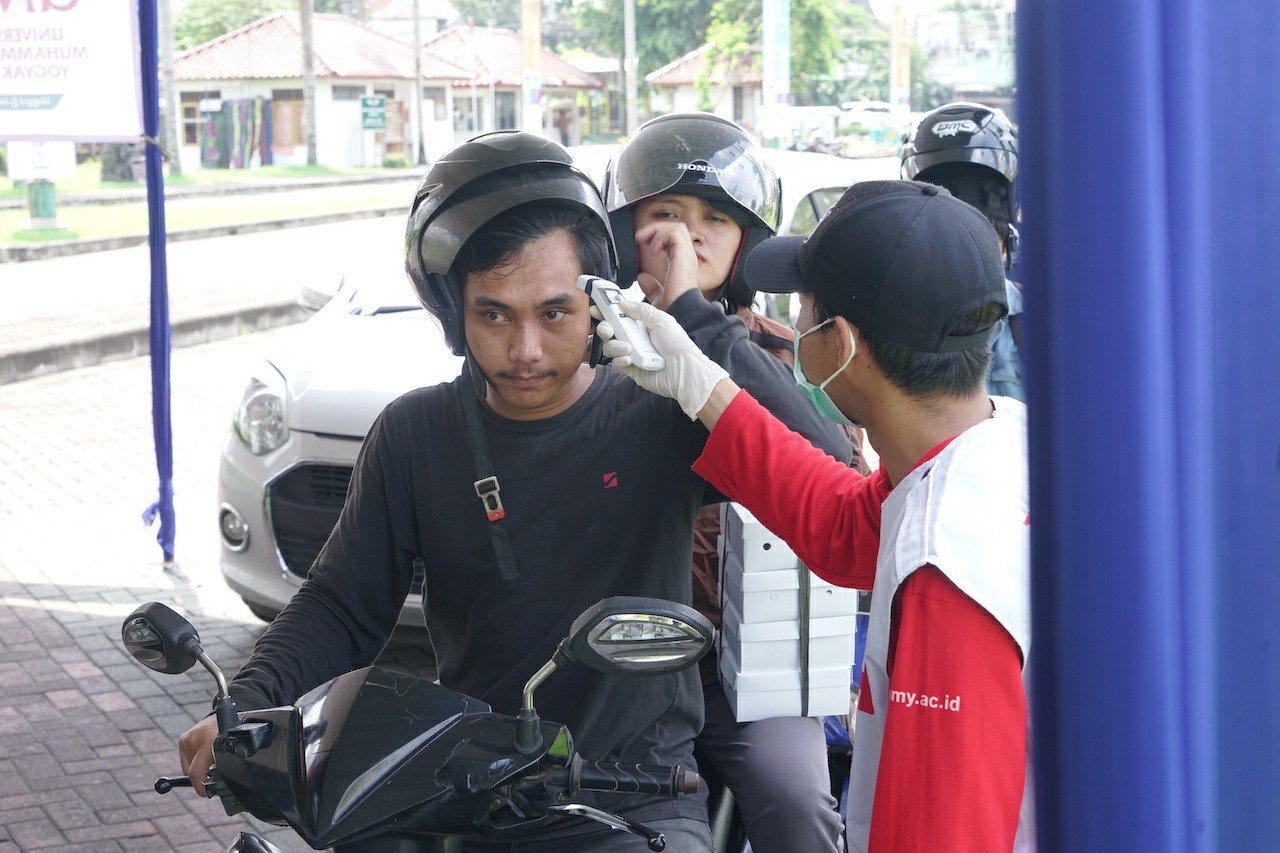 The Office for Research, Publication and Community Service of Universitas Muhammadiyah Yogyakarta (LP3M UMY) encouraged the government to engage in community engagement or involve the community as the frontline in accelerating the handling of COVID-19. UMY, as a tertiary institution in Indonesia, continues to be committed to encouraging the implementation of community engagement by continuing to communicate to stakeholders, the academic community, and the central and regional governments to fight COVID-19 together. As of March 14, 2020, UMY has issued a COVID-19 mitigation policy that involves the academic community and stakeholders.
The Office for Research, Publication and Community Service of Universitas Muhammadiyah Yogyakarta (LP3M UMY) encouraged the government to engage in community engagement or involve the community as the frontline in accelerating the handling of COVID-19. UMY, as a tertiary institution in Indonesia, continues to be committed to encouraging the implementation of community engagement by continuing to communicate to stakeholders, the academic community, and the central and regional governments to fight COVID-19 together. As of March 14, 2020, UMY has issued a COVID-19 mitigation policy that involves the academic community and stakeholders.
In terms of research and community service, LP3M UMY stated that the various efforts to handle COVID-19 by the government required community response in the form of community engagement. This is because the number of confirmed cases and casualties of COVID-19 has continued to increase since the first confirmed case was announced by president Joko Widodo on March 2, 2020. Statistically, the World Health Organization (WHO) recorded 3,181.62 COVID-19 cases with a death toll of 224,301 people. In Indonesia alone, as of May 1, 2020, the Task Force for the Acceleration of Handling COVID-19 showed a total of 10,551 confirmed cases with 800 fatalities and 1,591 recoveries.
In a limited discussion with LP3M UMY , Tuesday (5/5) Dr. Gatot Supangkat, MP., Head of LP3M UMY emphasized that community engagement is expected to be a crucial strategy for the government to complete various policies that have been decided by the central government, ministries and non-ministerial institutions, as well as local governments to prevent the spread, accelerate handling, services, as well as to overcome the impact of COVID-19. Government policies related to COVID-19 have covered all sectors such as policies for MSMEs such as postponement of principal and interest installments, PPh 21 coverage policies for industrial workers, pre-employment cards, and also policies for the poor such as pre-employment cards, layoffs, and logistical support in the form of food supplies.
According to Dr. Dyah Mutiarin, M.Sc., head of the research division of LP3M UMY, a community engagement strategy is needed to slow down the transmission of COVID-19 and to protect the public at large. “In its application, the public is expected to increase their social awareness and participate in preventing infection and transmission of COVID-19. Communities need to be disciplined, especially in implementing health protocols established by the government in Presidential Decree of the Republic of Indonesia Number 12 of 2020 concerning Non-natural Disasters Spread of COVID-19 as a National Disaster, “she said.
in community engagement, two-way proactive communication between the government and the community is necessary. “Accurate and transparent data information on handling COVID-19 is the meeting point between policy implementation and community response. This can be motivated by reasons to reduce public panic. However, in community engagement, the government needs to implement participatory communication models that provide opportunities for the community to produce and manage information independently, “explained Mutiarin.
The Head of the LP3M UMY Community Service Division, Dr. Adhianty Nurjanah, M.Sc., stated that this could be done by empowering the community through the establishment of call centers and also collaborating with disaster-resilient communities, local health centers, and the smallest social environments to become communicators and mediators that can be easily reached by society to the lowest level.
“Communication barriers in handling COVID-19 can be easily dealt with. Not only that, participatory communication can also reduce the spread of circulating hoaxes. The community is currently experiencing infodemic which is a condition where people receive information from various sources but the accuracy of data and also the source is still very doubtful, “said Adhiyanti.
In order to streamline community engagement, Adhiyanti added that a large-scale socialization is needed for the community to deliver an educational and effective message. “The government must make a massive social campaign on matters related to COVID-19 by using language that is straightforward, easily understood, or even uses local languages that are easily accepted by the public. So far, the message delivered to the public is still difficult for some circles like for example the term physical distancing,” she concluded. (ays)






